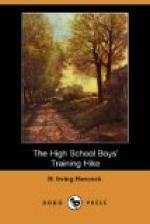“If you want to know a good definition of ‘generosity,’ then ask Hazy,” snorted Dalzell.
“Come on!” cried Dick good-humoredly. “Scatter. Some for wood, some for water. Tom and I will get the kitchen kit ready for a meal. But we must have the wood and water before we can prepare luncheon.”
At that suggestion of something to eat there was a general rush to get things in readiness. As soon as a fire was going in the stove in the wagon, Dick put on a frying pan. Into this he dropped several slices of bacon. Tom, over a fire built on the ground, set the coffee-pot going. In a pot on the stove Dick put potatoes to cook.
Now Dave rattled out the dishes, as soon as Greg and Hazy had set up the folding table. Dan placed the chairs.
“Get ready!” called Dick, as soon as he had fried two platters full of bacon and eggs. Tom, will you try the potatoes?”
“Done,” responded Reade, after prodding the potatoes with a fork.
“What shall we do with the food that’s left over?” asked Danny Grin, as he began to eat.
“There isn’t going to be any food left over,” Dick laughed. “You fellows will be lucky, indeed, if you get as much as you want.”
Everyone was satisfied, however, by the time that the meal was finished.
“Greg and Harry may have the pleasure of washing the dishes,” Dick suggested.
“Oh, dear!” grunted Hazy, but he went at his task without further remarks.
Before one o’clock everything was in readiness for going forward again, save for putting the horse between the shafts of the wagon. Prescott, however, put a proposition to rest until two o’clock before his chums. It was unanimously carried.
Despite his desire for a walking record that day, Darry proved quite willing to lie off at full length in the shade of the trees and doze as much as the flies would permit.
Dick and Tom strolled slowly down toward the road, halting by a couple of trees.
“There’s something you don’t often see, nowadays,” spoke up Tom after a while.
He nodded back up the road. Coming in the same direction that the boys themselves had traveled was a faded, queer-looking old red wagon, much decorated on the outside by a lot of hanging, swinging tin and agate ware.
“That’s the old-fashioned tin-peddler that I’ve heard a good deal about as being a common enough character some forty years ago,” said Prescott. “Our grandmothers used to save up meat-bones, rags and bottles and trade them off to the peddler, receiving tinware in return.”
“The man on that wagon was doing business forty years ago,” remarked Tom. “In fact, judging by his appearance, he must have been quite a veteran at the business even forty years ago.”
A bent, little old man it was who was perched upon the seat of the red wagon. Once upon a time his hair had been tawny. Now it was streaked liberally with gray. He was smoking a black little wooden pipe and paying small attention to the sad-eyed, bony horse between the shafts. There was a far-away, rather dull look in the old peddler’s eyes.




